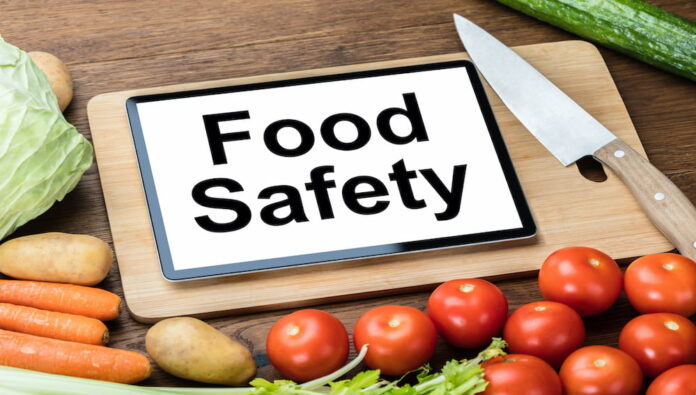Although the United States food supply is incredibly safe, around one in six Americans end up with food poisoning every year. Food poisoning occurs when your food is contaminated by nasty bacteria (like staphylococcus or E. coli), which is commonly caused by improper food handling or storage. Food hygiene at home therefore shouldn’t be an afterthought. By taking key food hygiene steps, you can better keep your kitchen hygienic and your food safe and fresh.
Keep Your Refrigerator at the Right Temperature
Keeping your fridge at the right temperature is essential for keeping bad bacteria at bay and, consequently, preventing the risk of food poisoning.
The ideal temperature for your refrigerator, according to the FDA, is at or below 40°F – however, by keeping it even lower at between 35°F-38°F, you can better protect your food from harmful bacteria (once it gets any warmer than 40°F, bacteria starts multiplying fast). 35°F-38°F is as cold as your food can get without freezing. In fact, temperatures any higher than this may even be too warm for your refrigerator (particularly if the in-built temperate gauge isn’t truly accurate).
In that case, you’ll also find the contents of your fridge goes off too fast, which in turn can cause tummy upsets thanks to bacteria like E. coli and Salmonella.
Prevent Pests
One essential aspect of maintaining food safety in your kitchen is ensuring proper pest control measures are in place, such as contacting a reliable pest control company like pest control Columbus Oh to handle any infestations.
As many as 124 million households across the U.S. have reported seeing roaches in their homes in the past year, while 14.8 million have seen rodents. Pests carry a host of diseases, as well as the potential to damage your home.
Pest prevention should therefore be a key priority for everyone. So, for example, be sure to wipe down your counters regularly to ensure there’s no lingering crumbs or spills. Peanut butter, in particular, is a huge magnet for cockroaches and rodents.
You should keep the outside of the jar clean, and store it safely away in a closed cupboard. Ideally, you should also store dried foods like flours, grains, and seeds in food-safe jars or Tupperware; packets can be easy to spill and are tempting for pests.
Wash your Dish Towels Regularly
You may not realize it, but your dish towels are major breeding grounds for bacteria, particularly if they’re damp. It’s therefore crucial to wash them regularly.
Ideally, you want to wash your dish towels at 140°F or hotter (just be careful not to exceed the maximum temperature stated on the care label).
The high heat ensures bacteria and other nasties are killed successfully. Similarly, your washing-up sponges also harbor harmful bacteria, so you’ll also need to wash these just as often.
For example, you can soak them in an antibacterial sterilizing solution, before writing them out, and leaving them to air dry. You may also want to invest in sponges that can be machine washed at high heats like 140°F.
Food hygiene should be a key consideration in every kitchen. By keeping your refrigerator at the right temperature, preventing pests, and washing your dish towels regularly, you can prevent unwanted pests and germs and keep your kitchen safe.
Read Also
- Ketamine-Assisted Therapies: Impacts on Employee Wellbeing
 Workplace stress is common today. Many employees feel tired, anxious, or burned out. Regular therapy can help, but some people need more support. Ketamine-assisted therapy is showing good results for mental health. A ketamine-assisted therapist guides each session safely. This therapy can improve mood, focus, and energy. Learning more about it can help teams stay… Read more: Ketamine-Assisted Therapies: Impacts on Employee Wellbeing
Workplace stress is common today. Many employees feel tired, anxious, or burned out. Regular therapy can help, but some people need more support. Ketamine-assisted therapy is showing good results for mental health. A ketamine-assisted therapist guides each session safely. This therapy can improve mood, focus, and energy. Learning more about it can help teams stay… Read more: Ketamine-Assisted Therapies: Impacts on Employee Wellbeing - The Future of Men’s Health: Why Telehealth Is Here to Stay
 Telehealth isn’t just a pandemic trend that faded into the background. For Australian men, it has become one of the most practical, time-saving, and stress-free ways to manage everyday health — and it’s shaping the future of how we access care. Platforms like DOCTO, an Australian online doctor and specialist telehealth service, are leading the… Read more: The Future of Men’s Health: Why Telehealth Is Here to Stay
Telehealth isn’t just a pandemic trend that faded into the background. For Australian men, it has become one of the most practical, time-saving, and stress-free ways to manage everyday health — and it’s shaping the future of how we access care. Platforms like DOCTO, an Australian online doctor and specialist telehealth service, are leading the… Read more: The Future of Men’s Health: Why Telehealth Is Here to Stay - How to Build a Simple, Clean Skincare Routine ?
 You don’t need a complicated skincare routine. It doesn’t have to be something that requires twenty different products and confusing steps. Your routine works well with just a few high-quality clean ingredients. The beauty industry keeps pushing more products, but your skin actually needs less. You only need a simple approach to get better results… Read more: How to Build a Simple, Clean Skincare Routine ?
You don’t need a complicated skincare routine. It doesn’t have to be something that requires twenty different products and confusing steps. Your routine works well with just a few high-quality clean ingredients. The beauty industry keeps pushing more products, but your skin actually needs less. You only need a simple approach to get better results… Read more: How to Build a Simple, Clean Skincare Routine ? - How Preventive Dental Care Supports Overall Health
 Have you ever wondered how a simple dental checkup could impact your entire body? Oral health is more than just a bright smile. Studies show that poor dental habits can contribute to serious health problems. Gum disease and tooth decay are linked to heart disease, diabetes, and infections. Yet, many people overlook preventive dental care.… Read more: How Preventive Dental Care Supports Overall Health
Have you ever wondered how a simple dental checkup could impact your entire body? Oral health is more than just a bright smile. Studies show that poor dental habits can contribute to serious health problems. Gum disease and tooth decay are linked to heart disease, diabetes, and infections. Yet, many people overlook preventive dental care.… Read more: How Preventive Dental Care Supports Overall Health - Seeing Clearly in a High-Tech World: A Deep Dive into Advanced Vision Care Services
 Protecting your eyesight isn’t optional—it’s essential. Modern eye care has evolved far beyond basic exams, offering advanced diagnostics, personalized treatments, and surgical innovations that keep vision sharp for life. A leading example is Intermountain Eye Center, home to specialists like Dr Fishburn Boise, where patients receive comprehensive, high-level vision care designed to preserve long-term eye… Read more: Seeing Clearly in a High-Tech World: A Deep Dive into Advanced Vision Care Services
Protecting your eyesight isn’t optional—it’s essential. Modern eye care has evolved far beyond basic exams, offering advanced diagnostics, personalized treatments, and surgical innovations that keep vision sharp for life. A leading example is Intermountain Eye Center, home to specialists like Dr Fishburn Boise, where patients receive comprehensive, high-level vision care designed to preserve long-term eye… Read more: Seeing Clearly in a High-Tech World: A Deep Dive into Advanced Vision Care Services - Why the Keto Diet Works for Some People—and Fails Dramatically for Others: An Ayurvedic Breakdown for Modern Healthcare
 The keto diet has dominated weight-loss culture for years. For some people, it produces rapid fat loss, stable energy, and improved mental clarity. For others—especially those who gain weight easily—it leads to burnout, digestive distress, rebound weight gain, high cholesterol, and a metabolism that feels slower than before. Healthcare often frames this as a discipline… Read more: Why the Keto Diet Works for Some People—and Fails Dramatically for Others: An Ayurvedic Breakdown for Modern Healthcare
The keto diet has dominated weight-loss culture for years. For some people, it produces rapid fat loss, stable energy, and improved mental clarity. For others—especially those who gain weight easily—it leads to burnout, digestive distress, rebound weight gain, high cholesterol, and a metabolism that feels slower than before. Healthcare often frames this as a discipline… Read more: Why the Keto Diet Works for Some People—and Fails Dramatically for Others: An Ayurvedic Breakdown for Modern Healthcare - How to Choose the Best Assisted Living Facility for Seniors
 Are you looking for the right assisted living facility for a senior loved one? Choosing a place can feel overwhelming. There are many factors to consider, from care services to the environment. Safety, comfort, and social opportunities play important roles in daily life. Each senior has unique needs and preferences that must be met. Understanding… Read more: How to Choose the Best Assisted Living Facility for Seniors
Are you looking for the right assisted living facility for a senior loved one? Choosing a place can feel overwhelming. There are many factors to consider, from care services to the environment. Safety, comfort, and social opportunities play important roles in daily life. Each senior has unique needs and preferences that must be met. Understanding… Read more: How to Choose the Best Assisted Living Facility for Seniors - Burn Smart, Not Hard; Shape Burn: Clean Protein for Weight Management
 You want to feel light, strong, and confident. You don’t want crash diets or fake promises. You need a plan that works with your body, not against it. That’s where Shape Burn comes in. You can burn fat without losing strength. You can eat better and stay full. You can manage weight in a way… Read more: Burn Smart, Not Hard; Shape Burn: Clean Protein for Weight Management
You want to feel light, strong, and confident. You don’t want crash diets or fake promises. You need a plan that works with your body, not against it. That’s where Shape Burn comes in. You can burn fat without losing strength. You can eat better and stay full. You can manage weight in a way… Read more: Burn Smart, Not Hard; Shape Burn: Clean Protein for Weight Management









